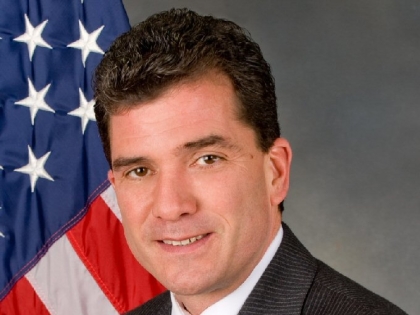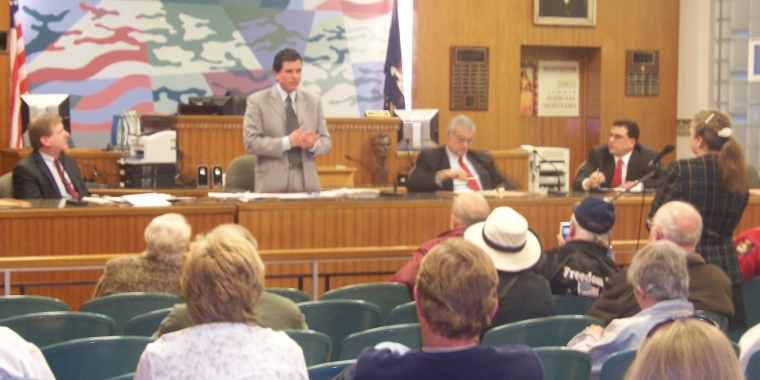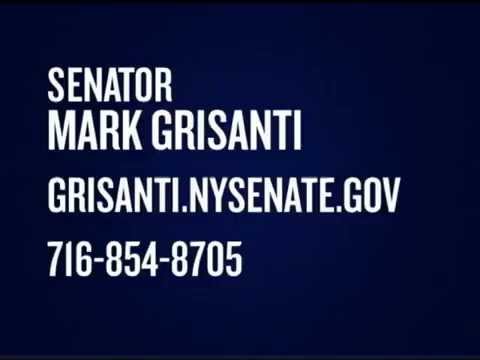
City Hall forum addresses range of topics
Mark Grisanti
April 8, 2011
-
ISSUE:
- Constituents Corner

State Sen. Mark Grisanti on Thursday conducted a town hall meeting on a wide range of issues with about 50 people at Tonawanda City Hall.
Grisanti, R-Buffalo, was invited to speak at the request of Tonawanda Councilman Chuck Gilbert. Erie County Legislator Kevin Hardwick, R-City of Tonawanda, also attended the forum to update residents on county issues.
Several speakers Thursday questioned Grisanti’s position on hydrofracking. Grisanti said he’s reserving an opinion on it until he reviews the findings of a scientific survey, the results of which he said are expected within the next few months.
“I’m not going to be the senator that destroys the water in New York state,” he said, adding that the other side of the issue is the amount of jobs it could bring to the area.
Another resident asked about the Tonawanda Coke plant in the Town of Tonawanda. The facility is embroiled in lawsuits due to its emissions containing levels of benzene — a known human carcinogen — that are significantly higher than state and federal guidelines.
Grisanti said members of his staff have been in contact with the plant to find out whether recent test results of its emissions show reduced levels of benzene.
Another topic that hit home for City of Tonawanda residents was the issue of protesters attending the funerals of fallen soldiers. Tonawanda this week lost a city native, Army Staff Sgt. Michael Lammerts, who was killed in Afghanistan. Dennis Smilinich, a member of the American Legion Post in Tonawanda, asked about a law that would require protesters to obtain a permit, with certain restrictions.
Grisanti was a co-sponsor of a state Senate bill that would require protesters to obtain county approval. Smilinich asked that the bill be changed to grant local municipalities that authority.
Wheeler Street resident Dawn Cain questioned the senator on a survey he sent out to his constituents, asking for their opinion on a range of issues, including mandatory drug testing for welfare recipients.
Grisanti said the state Assembly opposed a Senate measure requiring Medicaid benefit recipients to obtain a card with their fingerprint, confirming their identity as a way to reduce Medicaid fraud, including someone selling their Medicaid card to another individual. With the fingerprint card, a person wouldn’t receive benefits unless the print matched the information on the card.
That bill has been tweaked from a fingerprint to a palm scan, Grisanti said, adding, “I think it should be done.” He said three-quarters of the people who responded to his survey support mandatory drug testing for Medicaid benefits.
Buffalo resident Karen Brady grilled Grisanti on an aspect of the UB 2020 bill which she said would limit the transparency of contracts signed with the University at Buffalo if the legislation passes. “What’s wrong with having transparency in those transactions?” she pressed. Grisanti said Brady is misinformed, that there would be controls in place.
Brady also said she opposes UB 2020, claiming that it would price the students of middle-class families out of a good education. “I’m concerned as a parent that I will not be able to afford to put my kids through college,” she said. In response, Grisanti said the legislation states that the tuition rate would be locked in for students whose families make under $60,000.
Before taking questions, Grisanti outlined what he’s done since being elected to his first political office nearly 100 days ago. First on the list was his criticism of the recently passed state budget. “This budget that just came out was a terrible budget,” he said.
Grisanti explained that he voted in favor of it because it included many other pieces that he supported. “I’m not a one-issue person,” he said, adding that Senate Republicans made a number of changes that reduced government spending, a key campaign issue in his run against Democrat Antoine Thompson.
“Am I happy with this budget? No,” Grisanti said, “but it’s a bad budget that we made better.”
Turning to county issues, Hardwick touted county Legislature Republicans’ efforts to eliminate $800 million in extra spending proposed by the majority caucus. Spending and taxes, Hardwick said, are driving the region’s population loss. “We’ve got to take a stand,” he said.
Hardwick also used his time to address the public on an issue involving community colleges. He said City of Tonawanda taxpayers shelled out $382,000 alone last year because they get charged, due to a state law, for every city resident who attends Niagara County Community College.
“That’s killing us,” he said. Residents in areas farther away from NCCC, such as Buffalo and the southtowns, aren’t as impacted because most of their community college students attend Erie Community College.
Hardwick also talked about a deal with County Executive Chris Collins to provide $70,000 from last year’s surplus to address rodent control issues in suburbs like Kenmore and the Tonawandas. “Hopefully we’ll be able to get that passed next Thursday at the county Legislature,” Hardwick said.
Share this Article or Press Release
Newsroom
Go to NewsroomLocal veterans honored for their service
May 8, 2014

Your Voice With Senator Mark Grisanti
May 6, 2014

